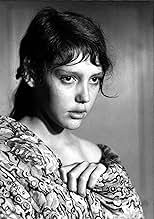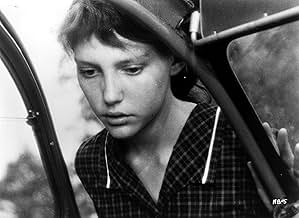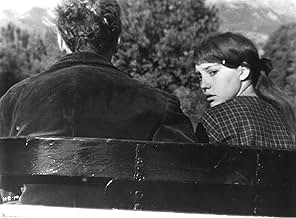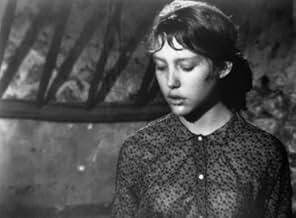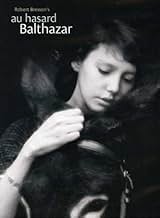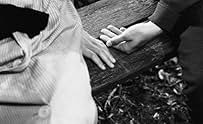Au hasard Balthazar
- 1966
- Tous publics
- 1h 35m
IMDb RATING
7.7/10
24K
YOUR RATING
The story of a mistreated donkey and the people around him. A study on saintliness and a sister piece to Bresson's Mouchette.The story of a mistreated donkey and the people around him. A study on saintliness and a sister piece to Bresson's Mouchette.The story of a mistreated donkey and the people around him. A study on saintliness and a sister piece to Bresson's Mouchette.
- Awards
- 7 wins & 2 nominations total
Mylène Van der Mersch
- Nurse
- (as Mylène Weyergans)
- Director
- Writer
- All cast & crew
- Production, box office & more at IMDbPro
Featured reviews
During the nineteenth century ,the comtesse de Segur wrote a novel for the children called "memoirs of a donkey" .A very pious writer,she chose the donkey as a symbol of humility...as Robert Bresson did I suppose.The very first pictures of the movie,with the children,"christening" the donkey ,might be a nod to the writer whom the young Bresson,like all his generation must have read when he was a young boy."Au hasard Balthazar " is an updated version of "les memoires d'un ane" ,but a very austere story:although Bresson's work enjoys a very high rating on the site,I must say that it's not for all tastes.I cannot imagine,say, a "matrix" fan getting enthusiastic about it.
Bresson's actors are non -professionals -with the exception of Anne Wiazemski,but it was her debut;then she became the par excellence intellectual actress,for the likes of Godard,Tanner and Garrel,all directors that easily make me yawn my head off-,but do not expect a "natural "performance.I hope the non-French speaking who wrote a comment saw the movie in French with English subtitles.Dubbed in another language ,Bresson's works lose a lot of their originality.Because the actors speak in a distant voice,in a neutral style as if they were reciting Descartes's "the Discourse on Method".They never show any emotion,even through their darkest hour (not even after the heroine's rape).
Bresson films his human characters as if they were Martians ,and his sympathy for the donkey is the only pity he has to give us.This beast of burden seems to carry on its back all the sins of the world,and his route is a calvary.A woman says "this donkey is a saint" .
Bresson showed us the Beast in Man and the Man in Beast.
Bresson's actors are non -professionals -with the exception of Anne Wiazemski,but it was her debut;then she became the par excellence intellectual actress,for the likes of Godard,Tanner and Garrel,all directors that easily make me yawn my head off-,but do not expect a "natural "performance.I hope the non-French speaking who wrote a comment saw the movie in French with English subtitles.Dubbed in another language ,Bresson's works lose a lot of their originality.Because the actors speak in a distant voice,in a neutral style as if they were reciting Descartes's "the Discourse on Method".They never show any emotion,even through their darkest hour (not even after the heroine's rape).
Bresson films his human characters as if they were Martians ,and his sympathy for the donkey is the only pity he has to give us.This beast of burden seems to carry on its back all the sins of the world,and his route is a calvary.A woman says "this donkey is a saint" .
Bresson showed us the Beast in Man and the Man in Beast.
For all its formal brilliance, this is one of the least watchable films in the world, despite its enchanted opening and fairy tale elements. Seen through the eyes of a much-abused donkey, we are treated to a litany of corruption, legal (a man is accused of fraud), social (provincial France has never seemed so pinched, arid, spiritually void, with its inhabitants leading lives, in Joyce's words, of 'quiet desperation'), criminal (a gang of violent teenage smugglers), and personal (the leader of said gang rapes, with his cronies, his girlfriend, then locks her up naked), as well as a murder and suicide. What makes this possibly bearable is the limpidity and formal beauty of Bresson's style, and admirers refer to his pinpointing spiritual grace in human suffering, but I wouldn't count on it.
It took me years to track down a video copy of this rare film. It was definitely worth searching for. It's my favorite of Bresson's films. A very intense and dark drama about the quality of human and animal life on the face of the earth. This film will definitely bring you to your knees.
Born into a world of despair, pain and fear, with a back to carry allsorts on and two eyes to fill with tears, abused and often put upon, never knowing where things might have gone, but conforming to the stick and whip, while no one hears your prayers.
Poor old Balthazar doesn't know which way to turn, on occasions folks are kind and free, at other times they let him burn, but why are they so changeable, what makes these people tick, is it natural that their spirit is to hurt, with pain inflict.
The hazards of being a young woman growing up in rural France and the challenges of a donkey with the same backdrop, both brilliantly performed by the donkey and Anne Wiazemsky, who leave you under no illusion of the suffering they have to endure.
Poor old Balthazar doesn't know which way to turn, on occasions folks are kind and free, at other times they let him burn, but why are they so changeable, what makes these people tick, is it natural that their spirit is to hurt, with pain inflict.
The hazards of being a young woman growing up in rural France and the challenges of a donkey with the same backdrop, both brilliantly performed by the donkey and Anne Wiazemsky, who leave you under no illusion of the suffering they have to endure.
The film's ending is one of the most memorable in cinema, and achieves an eerie grace, consistent with its almost unique tone - allusively Biblical and allegorical, yet resistant to specific meanings and interpretations. The plot is a narrative of human cruelty and escalating despair, but always with enough mystery in the motivation to ward off easy condemnations; and perhaps even to indicate divine guidance. Throughout, Wiazemsky seizes on the donkey as a symbol of transcendence(her mother calls it a saint in the end); it's formally christened at the beginning and undergoes something approaching a formal funeral, all of which gives its life the contours of a spiritual journey of discovery. The narrative encompasses both revelations (the interlude in the fair; new tortures like the mean old man who starves and beats him) and retrenchment; both life's austerity, its roots in servitude, and its enormous potential dignity. Never was a donkey filmed so evocatively - but as always with Bresson, the simplicity is thrilling too - there's no false artistry here; no dubious anthropomorphism. A necessary film, and I'm amazed that I'm the first one to be commenting on it here.
Did you know
- TriviaBalthazar was an untrained donkey during most of the filming, which made Robert Bresson's work a real challenge. The only scene for which the donkey was trained was the circus math trick.
- GoofsIn the very last shot of the film the shadow of the camera man or someone else enters the picture from the bottom right.
- Quotes
Gerard: Lend him to us.
Marie's mother: He's worked enough. He's old. He's all I have.
Gerard: Just for a day.
Marie's mother: Besides, he's a saint.
- Alternate versionsRestored in 2014 from the original 35mm negative by the Éclair Group and L.E. Diapason.
- ConnectionsEdited into Histoire(s) du cinéma: Seul le cinéma (1994)
- SoundtracksPiano Sonata No.20 in A Major, II. Andantino (D. 959)
Music by Franz Schubert
Performed by Jean-Joël Barbier
- How long is Au hasard Balthazar?Powered by Alexa
Details
- Release date
- Countries of origin
- Languages
- Also known as
- Zum Beispiel Balthasar
- Filming locations
- Production companies
- See more company credits at IMDbPro
Box office
- Gross US & Canada
- $45,406
- Opening weekend US & Canada
- $8,436
- Oct 19, 2003
- Gross worldwide
- $45,406
- Runtime
- 1h 35m(95 min)
- Color
- Sound mix
- Aspect ratio
- 1.66 : 1
Contribute to this page
Suggest an edit or add missing content


